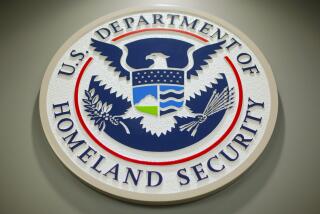U.S. supervision is ordered for convoys
- Share via
washington -- Secretary of State Condoleezza Rice on Friday ordered all diplomatic convoys in Baghdad to travel under the supervision of U.S. government security officials, a drastic overhaul of operations after allegations that the department’s private guards, Blackwater USA, had engaged in unnecessary violence in the Iraqi capital.
Under Rice’s order, all convoys will be accompanied by official monitors from the department’s Diplomatic Security Bureau, and video cameras will be mounted in vehicles. In addition, radio communication will be recorded and will be archived along with the video and electronic tracking data so diplomats can better review Blackwater’s performance.
The order marks a sharp reversal for Rice and the State Department, which for weeks has maintained it has adequate controls in place to monitor Blackwater contractors, who accompany U.S. diplomatic officials as they travel in Iraq.
As recently as last week, John D. Negroponte, the department’s second-highest official and the former U.S. ambassador to Iraq, defended the embassy’s oversight of Blackwater, saying the contractor operated under strict standards monitored with “close” supervision by State officials.
But in announcing the new measures, the department said members of a commission appointed by Rice to investigate State’s oversight of Blackwater determined that the embassy should collect more information on convoys so that any disputed incident could be better examined.
State Department spokesman Sean McCormack said the additional measures did not mean that Rice believed previous oversight was inadequate but that she wanted to strengthen the “management controls” the embassy had over Blackwater.
“This is a good way to be able to protect all involved, in the case that there is an incident, that you have at the very least some objective baseline account of what went on,” McCormack said.
But U.S. officials and outside analysts said the move also was a reaction to growing international outrage that was further eroding U.S. standing in Europe and the Middle East.
In those regions, the officials said, news reports about Blackwater’s involvement in a Sept. 16 shooting that left at least 11 Iraqis dead have run repeatedly on local media, hindering the department’s public diplomacy efforts.
The Pentagon ordered a crackdown on its private security contractors more than a week ago, leaving State one of the last U.S. agencies to defend existing government oversight of the thousands of armed guards operating in Iraq.
Questions surrounding the department’s handling of Blackwater-related shooting incidents intensified Friday as a private security contractor for the Pentagon, Combat Support Associates, acknowledged it had unknowingly hired the former Blackwater contractor who is the suspect in the Christmas Eve killing of an Iraqi guard.
According to reports gathered by congressional investigators, the former Blackwater contractor, a one-time Army paratrooper identified as Andrew J. Moonen, shot a guard of Iraq’s vice president after a party in Baghdad’s fortified Green Zone. The congressional investigators said that Moonen was flown out of Iraq less than 36 hours after the incident and that State had approved his departure.
A spokesman for Combat Support Associates said that the company had done the required vetting of Moonen but that the Christmas Eve incident did not appear on his record and that the State Department did not inform the company he was the suspect. Moonen worked for Combat Support Associates from February to August.
“He was subject to the normal due diligence that any company would perform, and there was no indication that he was a suspect,” said the spokesman, Gary Lewi. “There was nothing there.”
Rep. Henry A. Waxman (D-Beverly Hills), chairman of the House Oversight and Government Reform Committee, who has been investigating Blackwater’s performance in Iraq, wrote to Rice on Friday requesting Moonen’s personnel records and questioning why the contractor was able to return to the Middle East just two months after the shooting.
“Serious questions now exist about whether the State Department may have withheld from the U.S. Defense Department facts about this Blackwater contractor’s shooting of the Iraqi guard that should have prevented his hiring to work on another contract in support of the Iraq war,” Waxman wrote.
Rice’s decision to step up monitoring of Blackwater could present logistical challenges, hindering the ability of U.S. diplomats to travel outside the Green Zone.
Of particular concern, according to officials, is the new rule requiring that an officer from the Diplomatic Security Bureau ride in every convoy traveling within the capital, with advance teams that precede most convoys, and with backups held in reserve in case they are needed.
The order will require additional diplomatic security officers, but State officials refused to specify how many, saying disclosing such information would threaten security.
The bureau’s director, Richard J. Griffin, told Waxman’s committee this week that Blackwater guards were needed in Iraq because State did not have enough of its own diplomatic security officers to perform the mission.
The bureau has added 175 guards in the last two years, bringing the total to 1,450, Griffin said. But there are only 36 agents now in Iraq.
So far this year, the embassy has run 1,900 convoys in Baghdad -- nearly seven a day.
McCormack said the Diplomatic Security Bureau informed Rice that it could undertake the new mission, but he added that agents might be forced to move from other posts around the world.
McCormack also said Rice’s decision to add cameras and official monitors to convoys was not a judgment on Blackwater’s conduct in the Sept. 16 incident. The company maintains that its convoy was ambushed that day; Iraqi officials have said Blackwater guards fired without provocation.
McCormack said investigation of the incident, now being led by the FBI, was continuing.
--
Times staff writer Paul Richter contributed to this report.
More to Read
Sign up for Essential California
The most important California stories and recommendations in your inbox every morning.
You may occasionally receive promotional content from the Los Angeles Times.











